WASHINGTON, D.C. -- Venezuela's President Hugo Chavez recently announced the country should "prepare for war" against Colombia, a sign of how relations between the two nations continue to deteriorate. A Gallup survey finds that 14% of Colombians approved of Venezuela's leadership in August 2009, which is similar to the 16% measured last year, but down from 29% in July 2007.
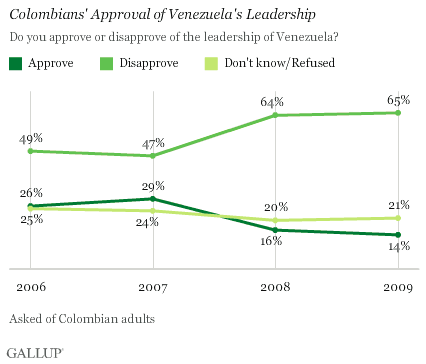
Across the border, Venezuelans' approval of Colombia's leadership remained fairly steady as it has over the past three years, at 43%.
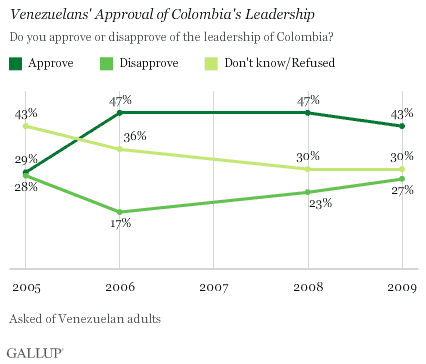
Chavez's directive to prepare for war -- seen as rhetorical until Venezuela destroyed two footbridges along the border -- came in response to Colombia's signed agreement to allow the United States access to up to seven of its military bases. Colombia's President Alvaro Uribe has stated that the agreement is meant to combat drug traffickers and guerillas; Chavez claims it is an attack on his country's sovereignty.
Gallup also surveyed in both nations on respondents' attitudes toward Presidents Chavez and Uribe. Over the past two years, more Venezuelans approved of Uribe than Colombians approved of Chavez. However, the percentage of Venezuelan respondents who did not express an opinion about Uribe is higher than the percentage of Colombians who did not have an opinion about Chavez, indicating Chavez's likely more substantial notoriety across the region.
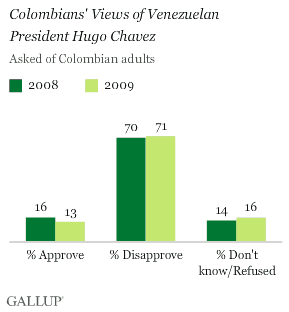
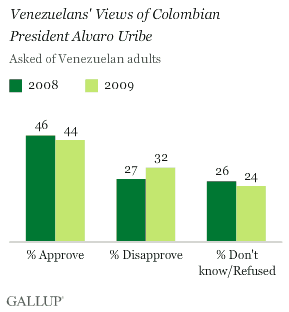
A History of Tension
Chavez's directive to prepare for war is the most recent episode in Chavez-Uribe saga, which last came to a head in late 2007, when the two leaders clashed over how to negotiate with rebel guerilla forces in Colombia. Following that incident, Colombians' approval of Venezuela's leadership dropped from 29% in July 2007 to 16% in August 2008, while disapproval jumped from 47% to 64%. Over the same period, Colombians' approval of their own leadership rose from 45% to 67%, with disapproval falling from 44% to 27%.
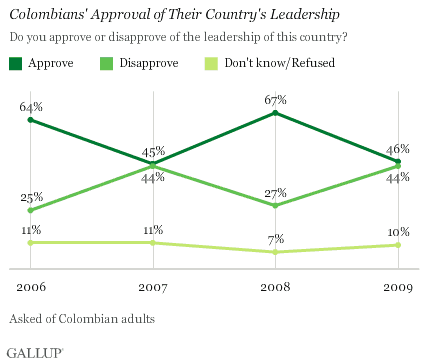
Gallup did not survey in Venezuela in 2007, but surveys between 2006 and 2008 do show that Venezuelans' approval of Colombia's leadership remained steady at 47%, which is more than double the proportion of Colombians who approved of Venezuela's leadership in the same period. Venezuelans' approval of their own leadership fell slightly between 2006 and 2008, from 61% to 52%.
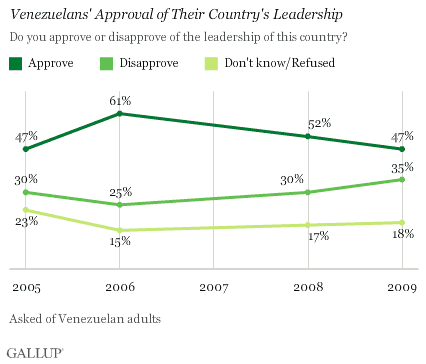
The Chavez Divide
Disputes over insurgents and drug trafficking underscore the political divide between the leftist Chavez and the conservative Uribe. Gallup surveyed respondents in both nations on their views of socialism and capitalism. Colombians who approve of Venezuela's leadership are more likely to say they are more socialist than capitalist, showing that Chavez is a polarizing political figure even outside Venezuela.
Bottom Line
How Colombians and Venezuelans view each other's leadership may give early insights into the political future of each government, particularly in light of escalating tensions between the two countries. For Chavez, approval percentages are steadily down in Colombia and at home. Elsa Cardoso, a professor of international relations at the Central University of Venezuela, claims the current rhetoric against Colombia is merely a smokescreen to distract attention from Venezuela's rapidly deteriorating economy. Meanwhile, the majority of Colombian respondents approve of Colombia's leadership, as do more than 4 in 10 Venezuelans. Each government's handling of their bilateral relationship -- and the heavy trade ties that depend on it -- may well have an important effect on the region's ongoing ideological divide between those with pro-Chavez and anti-Chavez allegiances.
For complete data sets or custom research from the more than 150 countries Gallup continually surveys, please contact worldpollpartners@gallup.com or call +1.202.715.3030.
Survey Methods
Results are based on face-to-face interviews with 1,000 adults, aged 15 and older, conducted in June 2006, July 2007, June 25-Aug. 29, 2008, and July 14-Aug. 1, 2009, in Colombia. For results based on the total sample of national adults, one can say with 95% confidence that the maximum margin of sampling error ranged from a low of ±3.3 percentage points to a high of ±3.7 percentage points.
Results are based on face-to-face interviews with 1,000 adults, aged 15 and older, conducted in November 2005, December 2006, Aug. 3-Sept. 29, 2008, and July 22-Aug. 12, 2009, in Venezuela. For results based on the total sample of national adults, one can say with 95% confidence that the maximum margin of sampling error ranged from a low of ±3.2 percentage points to a high of ±4.0 percentage points.
The margin of error reflects the influence of data weighting. In addition to sampling error, question wording and practical difficulties in conducting surveys can introduce error or bias into the findings of public opinion polls.
